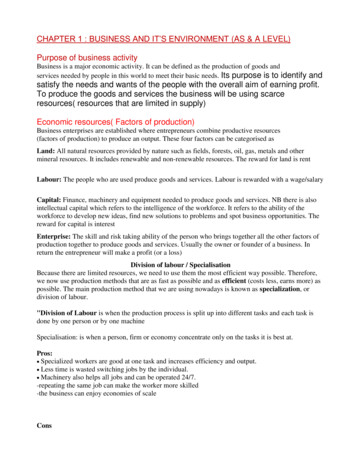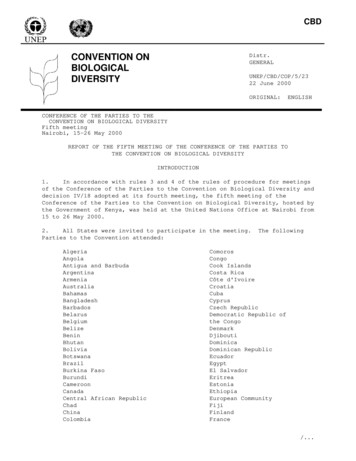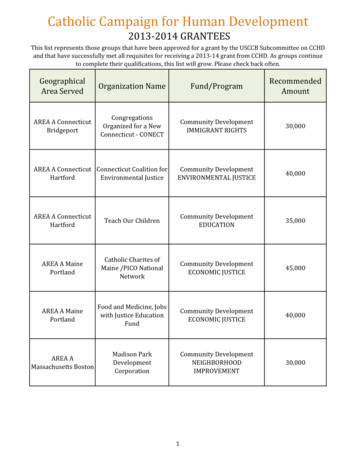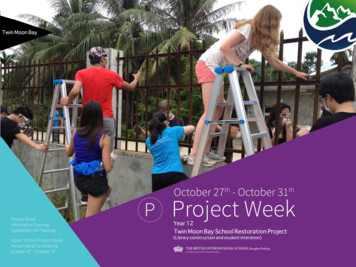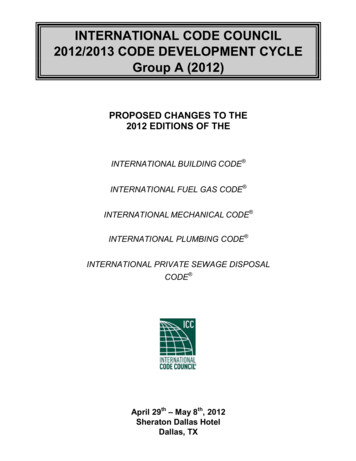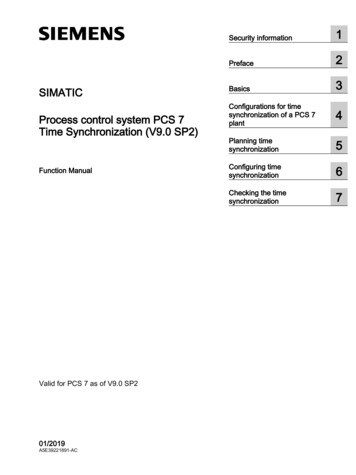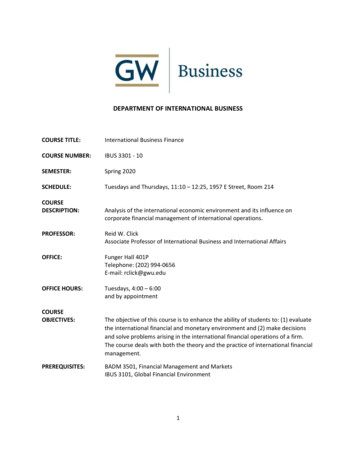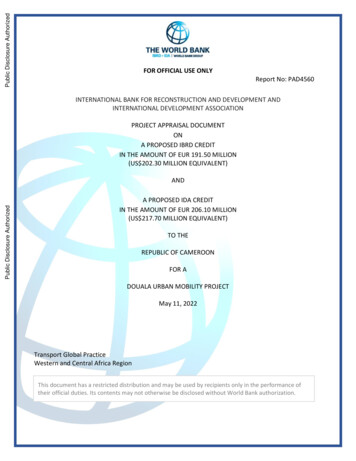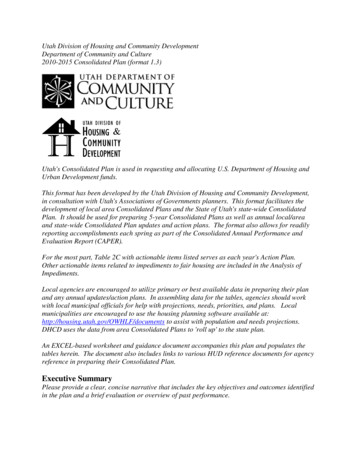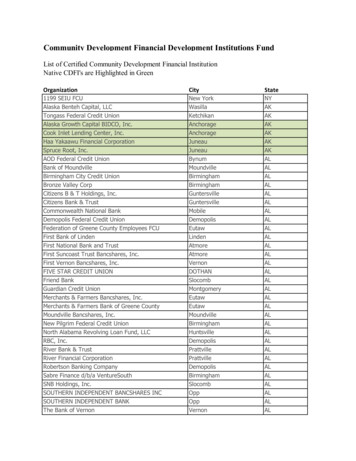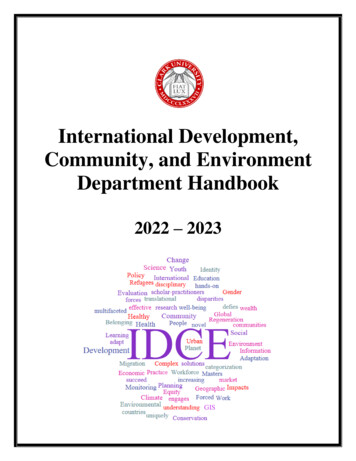
Transcription
International Development,Community, and EnvironmentDepartment Handbook2022 – 2023GIS
ContentsDirector’s Welcome .3Introduction.4Summary of Curriculum.4Degree Requirements.410-Unit MA/MS Degree Requirements . 512-Unit MA/MS Degree – Research Track Requirements . 5Program-Specific Curricula.6Community Development and Planning, MA . 6Environmental Science and Policy, MS. 7International Development, MA . 9Geographic Information Science, MS. 11Concentration in GIS for Development and Environment. 13Concentration in Conservation Applications . 16Concentration in Remote Sensing. 18Concentration in Community and Global Health Applications . 20Accelerated Degree Program .23Bachelor of Arts/Master of Arts in International Development, (BA/MA). 23Bachelor of Arts/Master of Science in Environmental Science and Policy, (BA/MS) . 26Bachelor of Arts/Master of Arts in Community Development and Planning (BA/MA) . 28Bachelor of Arts/Master of Science in Geographic Information Systems (BA/MS). 31Certificate Programs .33Certificate in Community and Global Health . 33Certificate in Monitoring and Evaluation . 34Certificate in Refugee, Displacement and Forced Migration Studies. 35Certificate in Youth Work Practice. 35Methods and Skills Options .36Concentrations .39Concentration Declaration Procedures and Responsibilities . 39Climate Change Impacts & Adaptation . 40Education, Youth, & Development. 41Environment & Development . 42Gender and Development . 43Health Equity . 44Healthy People/Healthy Planet . 44Monitoring & Evaluation. 45Refugees, Forced Migration, & Belonging. 46Urban Resilience. 47Culminating Course Unit: MA/MS 10th Unit Options .48Culminating Course Unit: MA/MS Thesis.52Internships .52IDCE Administrative Staff and Resources .541
Assistant to the Director. 54Manager of Student Services and Academic Affairs. 54Career Development Office . 54Academic Dishonesty Policy . 55Academic Probation Policy. 56Student Accessibility Services at Clark . 57Internal Graduate Student Transfer Process . 58Curriculum IDCE Graduate Program Course of Study Checklist .60IDCE Internship Proposal . 61IDCE Internship Report . 63Internship Supervisor Evaluation. 64MSGIS – Community and Global Health Applications . 68FMSGIS – Conservation Applications. 70MSGIS – Geographic Information Science for Development and Environment . 72MSGIS – Remote Sensing . 74Faculty Index .762
Director’s WelcomeWelcome to the International Development, Community and Environment Department (IDCE) at ClarkUniversity. Is your passion to achieve a more equitable world, free from problems like hunger andpreventable child deaths? Do you believe that it is important to understand how research and data shapepolicies and projects in the US and around the world? Do you want to learn from leading experts in fieldsincluding global health, environmental science, international development and geographic informationscience? Is it important to surround yourself with different personal, professional, and national backgroundswho also want to make a difference? If you said yes to those questions, then IDCE is the place for you.A hallmark of IDCE is our ongoing effort to meaningfully link theory to practice. We pride ourselves inundertaking engaged research that translates our high-quality primary research into policy and projects inthe world. We believe that the most effective practitioners integrate ideas across fields. Our problemcentered curriculum is evidence of our ongoing effort to ensure that students engage in crosscutting effortsto address global challenges so that they graduate equipped with the tools to have an impact on their placesof work.While our curriculum is unique, it is effective because of IDCE’s people. Our faculty produce highlyregarded publications, partner with organizations from small community NGOs to the world’s largestdevelopment donors, as well as engage in activism in Worcester and around the world. Our students includereturned Peace Corps volunteers, Former AmeriCorps volunteers, and early to mid-career professionals.More than 40% of IDCE students come from outside the US, which means that the typical IDCE classroomis characterized by a diversity of knowledge and experience that deepen the learning environment.The student community of IDCE and Clark is inclusive and supportive, with many students living veryclose to campus. Frequent social events are planned by fellow students, as well as excursions to interestingdestinations on weekends. Classes are taught by the IDCE faculty and are deliberately small. Doing soprovides students the opportunity to collaborate with each other and their faculty - a feature that fosters thesocial and academic community at IDCE.Our dedicated career development office works with IDCE students to set up internship opportunities andconnections to the broad IDCE alumni network. Today, graduates work at a range of organizations andcompanies, including small NGOs like Last Mile Health, large multilateral institutions such as the WorldBank, academic institutions including Duke University, government offices like the MassachusettsDepartment of Environmental Protection, government contractors such as Chemonics, and privatecorporations such as National Grid.Ultimately, our goal is to graduate students who are effective in their efforts to address major challenges intoday’s world – the sort of people that employers are seeking. Come join IDCE and be a part of the globalchange-makers making a difference in their communities and around the world.Sincerely,Ed Carr, Ph.D.Director and ProfessorInternational Development, Community, and Environment DepartmentClark University3
IntroductionInternational Development, Community, and Environment (IDCE) is home to scholar-practitionerspursuing solutions to pressing challenges in the 21st century. How can we support marginal communitiesas they adapt to the impacts of climate change? When do market forces succeed in increasing wealth andwellbeing, and when do they fail? What gives rise to health disparities across communities and countries,and how can we address them?Complex challenges require novel solutions built on a deep, multifaceted understanding of the task at hand.The IDCE community engages in translational, hands-on research that defies disciplinary categorization,and is uniquely effective. Our five degree programs – the MA in Community Development and Planning(CDP), the MA in International Development (ID), the MS in Environmental Science and Policy (ES&P),and the MS in Geographic Information Science (MSGIS) -- are integrated into a distinctive, multidisciplinary curriculum that enables our students to collaborate with classmates and faculty members ofdiverse backgrounds and areas of expertise – producing an educational experience parallel to that of theworking world.By thinking critically, acting collaboratively, and engaging responsibly with challenges around the globe,IDCE students build a more just, healthy, sustainable world during their time at Clark and beyond.Summary of CurriculumIDCE takes an innovative approach to graduate education. The student experience is a reflection of a worldwhere problems are not confined to a single discipline.The pioneering IDCE curriculum is designed to facilitate collaboration around challenges that emergethrough the interplay between domestic and international contexts and social and environmental issues. Wetake a problem-first approach, identifying a pressing social or environmental problem and then bringingtogether a diverse team of researchers and practitioners with the collective expertise to tackle it. As a result,the wide-ranging projects our students and faculty undertake do not fit comfortably within a singledisciplinary silo.Whether in the classroom, or working on projects, our students combine their own knowledge andexperience with insights shared by their peers, who include health specialists, geographic informationscientists, environmental scientists, international development professionals, and community developmentleaders, to gain an extraordinarily broad, yet coherent perspective as they work to develop actionablesolutions and make new discoveries.Degree RequirementsThe CDP, ES&P, and ID Masters programs may be completed with ten units of credit over 15 months(approximately three semesters). Students interested in a substantive research experience may pursue the 12unit research track, normally over two years and requiring the completion of a thesis. The MSGIS programrequires 12 units of credit (please see specific MSGIS program requirements, below).4
10-Unit MA/MS Degree RequirementsStudents will take ten courses in the following categories:1) Three “core” courses which vary by program.2) Two methods or skills courses. A representative list can be found in the Methods and Skills Coursessection. These courses further build the program-specific skills of students.3) Four concentration courses. IDCE Concentrations reflect faculty-identified focal areas of thedepartment. The concentrations cut across some or all of the ten-unit degree programs (Figure 1).4) One course as a Final Culminating Unit. There are several Final Culminating Unit options including: asupervised research or practitioner paper, an additional third methods/skills course, or a CollaborativeFinal Project (CFP).ProgramProgram Core(3 Units)IDES&PCDPIDCE 360IDCE 30287IDCE 344IDCE 361IDCE 30102IDCE 30281/30240IDCE 30247IDCE 30118IDCE 30289Methods/Skills(2 Units)See list of Methods/Skills coursesArea ofConcentration(4 Units)See descriptions of each area for eligible courses/modulesFinalCulminatingUnit (1 Unit)See Final Culminating Unit guidelinesFigure 1: Structure for MA/MS degree programs in ID, ES&P, CDP, and MHS12-Unit MA/MS Degree – Research Track RequirementsStudents will take 12 courses in the following categories:1) Three “core” courses which vary by program.2) Three methods or skills courses. A representative list can be found in the Methods and Skills Courses5
section. These courses further build the program-specific skills of students.3) Four concentration courses. IDCE Concentrations reflect faculty-identified focal areas of thedepartment. The concentrations cut across some or all of the other degree programs (Figure 1).4) Two units of substantive research, one of which must be a Thesis.Program-Specific CurriculaCommunity Development and Planning, MAPoverty and structural racism undermine the quality of life in urban areas in the United States, and the societalcosts can last for generations. The complexity of these problems demands an approach that goes beyond socialwork or urban planning or design. We developed the M.A. in Community Development and Planning becausewe believe social and economic justice are possible through the practice of engaged and future-focusedcommunity development.In Clark's Community Development and Planning program, students learn about the relations between powerand capital that produce inequity, and how to use this knowledge to build partnerships and capacity in people,places, organizations, and institutions in order to promote structural change. Our curriculum is strategic andfuture-oriented, informed by an understanding of historic political-economic trends and current affairs. Thecurriculum has depth in areas such as youth justice, economic development, food security, and managingneighborhood transformation through community engagement, planning, and non-profit leadership.Our faculty are engaged scholars and practitioners who work with, and for, state and city governments as wellas community development corporations and other non-profits on a range of initiatives aimed at addressingurban challenges. They bring their skills and experience into the classroom, working closely with students tochart career paths. As mentors, the faculty introduce students to internships and a broad professional network.The CDP ExperienceOur pedagogy is community-engaged. We incorporate internships, case studies, instructor-practitioners, andfield-based courses. The projects in our field-based courses are situated within highly effective and impactfulcross-sector partnerships forged by our faculty over many years. These include the Worcester Youth ViolencePrevention Initiative, food systems work with Worcester Public Schools, housing and neighborhood plans withlocal community development corporations, and reconstruction efforts in Puerto Rico.Courses reflect our community-engaged educational focus. Classroom discussions and applied projects tacklethe implications of community development and planning theory, planning techniques, decision-making andnegotiation, spatial analysis, and research and project evaluation methods.CDP Course of StudyThe MA in Community Development and Planning requires a minimum of 10 graduate course units, combiningmethods/skills courses and elective courses that link theory with practice. You can pursue one of ourconcentrations or create your own. One Culminating Course Unit is the final requirement.6
Program Requirements Three Core Course UnitsoIDCE 344 Going Local: Community Development and PlanningoIDCE 30240 Community Development Planning Studio or IDCE 30281 Community Needs andResource AnalysisoIDCE 30289 Community Development Finance Two Methods/Skills Course Units Four Elective Course Units within one of the IDCE concentrations One Culminating Course UnitCulminating Course UnitThere are several options:1. Research Paper (one Reader) - Typically based on secondary data analysis.2. Practitioner Paper (one Reader) - A deliverable based on the student's professional experience (e.g.consultancy).3. Collaborative Final Project- (led by faculty) - Tackling larger problems and issues, and providingstudents with team-based experience that reflects the professional setting.4. 3rd Methods/Skills focus via extra one unit course and related to the student's concentration or selfdesigned course of study/Students pursuing this option will write a synthesis paper connecting theirlearning across the methods/skills courses and with their concentration area.Environmental Science and Policy, MSThe Environmental Science and Policy (ES&P) Master of Science Program at Clark University preparesstudents for exciting careers at the intersection of environment, development, society, and technology. ES&Pbegan as a pioneer in the 1970s, one of the first environmental programs anywhere to explore this vitalintersection.The social and ecological challenges of the 21st Century are inherently complex and dynamic. ES&P teachesstudents to: apply knowledge and methods from both the natural and social sciences; to integrate quantitative,spatial, qualitative and narrative data; to understand and respond to complex challenges like climate change,pollution, and social injustice. The ES&P student becomes equipped with knowledge, skills and perspectives towork collaboratively with a wide array of stakeholders - communities, governmental agencies, NGOs,businesses, researchers, and donors - in ways that are sensitive to cultural, institutional, socio-political, andeconomic contexts. Our approach to teaching, scholarship and practice is constructively critical, engaged withdiverse people and places, and strongly integrative.ES&P students participate in research/practice collaborations that tackle a wide range of pressing issues,including health risks associated with toxic chemicals, climate change impacts and resilience, natural resourcegovernance, and capacity building for sustainable development in both domestic and international settings.7
ES&P students are educated to recognize, characterize, frame, understand and collaboratively respond to thechallenging issues of the 21st Century. As member of a closely-knit family of graduate programs - includingInternational Development, Community Development & Planning, and Geographic Information Science, ES&Pis an academically rigorous, professionally-oriented program. Faculty academic advisors work closely withES&P students to co-create a course of study that best prepares each student to be successful in meeting her/hisprofessional and academic goals.Course of StudyThe master's degree in ES&P requires 10 graduate course units. These include Core Courses (3 units),Method/Skill Courses (2 units), Elective Courses in an IDCE Concentration Area (4 units), and one FinalProject (1 unit). For the Final Project students can complete either a research paper, professional project,designated Collaborative Final Project (CFP) course, or a 3rd Method/Skill course. The two research-basedoptions are:1. Research Paper (one Reader) - Exploring a topic in an original way, typically based on secondary dataanalysis and/or case study analysis, with a literature review.2. Professional Project (one Reader) - Based on a student's professional relationship with a hostinstitution, producing something of value to the host and informed by academic research.The Core Courses and the Final Project (10th) unit provide ES&P students with a firm foundation in science andpolicy knowledge and skills, as well as research/practice experience. The electives in one of the IDCEConcentration Areas (e.g. Climate Change Impacts & Adaptation, Environment & Development, HealthyPeople/Healthy Planet, Urban Resilience) enable interdisciplinary collaboration with students in other IDCEprograms.As a small, vibrant interdisciplinary research university, Clark strongly encourages its students to takeadvantage of the courses offered within IDCE, as well as associated departments: Geography, Biology, Physics,Chemistry, Economics and Management.ES&P Program Requirements:Core Courses (3)The core courses provide ES&P graduate students with a common academic foundation in science, policy, andthe integration of the two:1.IDCE 30102 Case Studies in Environmental Issues and Policy Analysis. Through a series of casestudies, this course will introduce students to a range of approaches for structuring and analyzingcomplex environmental problems, including decision-tree analysis, value of information, benefit-costanalysis and benefit-risk analysis, multi-attribute analysis, data synthesis techniques, and uncertaintyanalysis.2. IDCE 30287 Fundamentals of Environmental Science. This foundation science class will give you theliteracy and skills you need to understand the science behind environmental problems that affect us all:water pollution; air pollution; environmental health risks; population growth and the over-exploitationof natural resources. It will also strengthen your math skills and quantitative ability. Principles from8
science (especially Physics and Chemistry), as well as methods from Math, are used to model two maintypes of environmental problem: a) problems of pollution; and b) problems of natural resource overexploitation3. IDCE 30118 Science Meets Policy in the Real World. This course is a workshop-style course thatexplores the intersection of science and policy using case studies. Real-world problems are inherentlycomplex: this course considers how to better understand such problems from multiple perspectives,then use this knowledge to inform how society may respond in the form of policies, programs, projectsand practices.Methods/Skills (2)Two courses that focus on the development of specific Methods or Skills, in consultation with the facultyadvisor.Culminating Course Unit (1)For the Final Project/10th unit students can complete either: a research paper, a professional project, designatedCollaborative Final Project (CFP) course, or 3rd Methods/Skills course.Students who choose one of the two research-based options (detailed above), present their work at the ES&PSymposium in their final semester.Concentration Electives (4)The electives in one of the IDCE Concentration Areas (e.g. Climate Change Impacts & Adaptation,Environment & Development, Healthy People/Healthy Planet, Urban Resilience) enable interdisciplinaryperspectives based on discussion and collaboration with students in other IDCE programs.Please view Clark's official Academic Catalog (www.clarku.edu/academiccatalog) for a complete listing ofcourse offerings. ES&P encourages students to take classes across IDCE programs and in other departmentsincluding Biology, Geography, Physics, Chemistry, Economics and Management.International Development, MAThe Master of Arts degree in International Development (ID) emphasizes the connection between criticalthinking and effective action. It is designed for scholars of international development, as well as for present andfuture practitioners of grassroots and community-based development.The challenge for the 21st-century is to promote just and equitable development and sustain environmentalresources through critical thought and reflection, planning, and action. The IDCE Department and the IDProgram stress approaches that foster alliances and partnerships between local institutions and broaderstakeholders such as external development agencies, universities, and state and non-governmentalorganizations.9
This Master's program helps students conceptualize innovative approaches to development problems bybuilding an understanding of the complex causes, influences and implications of poverty, inequality, socialinjustice, and conflict. Rooted in the belief that effective approaches merge many disciplines, the ID Programemploys a multi-disciplinary focus, with faculty from anthropology, development studies, economics,environmental sciences, forced migration studies, women and gender studies, education, geography, history,government, and management.The ID MA Program has three key elements: We challenge conventional ideas about development and seek innovative alternatives, We understand how the interplay of power relationships gives rise to social injustice and inequity, and We explore the linkages between critical thinking and effective development practices at thecommunity, regional, national, and global levels.ID Program RequirementsRequirement 1: Three Core Course Units: IDCE 360 Development Theory provides a critical overview of historical and contemporary theories ofdevelopment across a range of disciplines. The course encourages thinking about the multiplicity ofdevelopment processes and the complex relations of power that underlie them. IDCE 361 Project Management for Social Change develops skills in needs assessment, project design,implementation, management, budgeting, scheduling, work plans, and monitoring/evaluation. Studentsmay take a graduate policy-oriented course as a substitute for the 361 requirement, with prior approvalfrom their academic advisor. IDCE 30247 Development Economics introduces economic history, as well as microeconomics andmacroeconomics to non-economists, while illustrating practical applications of these techniques, toreal-world development situations. Students with a substantial background in economics (e.g. anundergraduate major in economics) may apply to be exempt from this requirement.Requirement 2: Two Methods and Skills Course Units: Select from the list of courses designated as Skills/Methods courses. We strongly suggest taking Qualitative, Quantitative, or Mixed methods prior to other, morespecialized courses.Requirement 3: Four Elective Course Units (to fulfill Concentration requirements) Select from the list of courses under each Concentration. Students can, with their academic advisor'sadvance permission in writing, take a course listed under a different Concentration, provided that theycan justify its relevance. One Elective Unit can be completed as an Internship or Directed Study.Requirement 4: One Culminating Course Unit. ID students must complete one Final Project (1 unit), all ofwhich require your academic advisor’s prior approval; there are several options for the Final Project:10
IDCE 30213 Master's Final Research or Practitioner Paper: 1) Research Paper (one Faculty Reader),typically based on secondary data analysis. 2) Practitioner Paper (one Faculty Reader), a deliverablebased on the student's professional experience (e.g. consultancy).Collaborative Final Project (led by faculty, generally in a course-based setting), tackles larger problemsand issues, and provides students with team-based experience that reflects the professional setting.A 3rd Methods/Skills focus via one extra Unit related to the student's Concentration or self-designedcourse of study. For this option, students must complete a 10-page (double-spaced)integrative reflection paper that "looks backwards" (i.e. explains how the course material informs theirlearning and practice to date) and "looks forwards" (i.e. describes how the course material willcontribute to their professional plans after graduation).After consulting with their advisors, students choose the option that is most compatible with theirresearch and professional interests, and then develop these interests independently through the FinalProject.Please see "Culminating Course Unit Learning Objectives and Deliverables" in this Handbook for furtherdetails.Directed Study and InternshipAs one of the elective credits, students have the o
1) Three "core"courses which vary by program. 2) Two methods or skills courses. A representative list can be found in the Methods and Skills Courses section. These courses further build the program-specific skills of students. 3) Four concentration courses. IDCE Concentrations reflect faculty-identified focal areas of the department.
